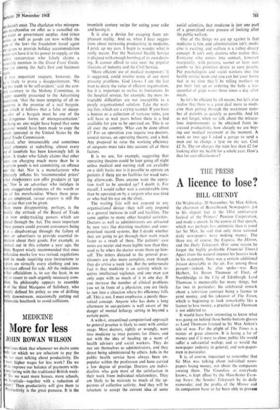More for less
MEDICINE JOHN ROWAN WILSON
metimes think that whenever we desire some fit for which we are reluctant to pay the e, we start talking about productivity. Do want higher wages for less _work? Do we t to improve our balance of payments with- interfering with the traditional British week- ? Do we want more houses, more schools, e hospitals—together with a reduction of lion? Then productivity will give them to Productivity is the great panacea. It is the twentieth century recipe for eating your cake and having it.
It is also a device for escaping from un- pleasant reality. And so, when I hear sugges- tions about increasing productivity in medicine, I prick up my ears. I begin to wonder what is really meant. For the National Health Service is plagued with enough humbug of its own devis- ing. It cannot afford to take over the popular illusions of industry and the Civil Service.
`More efficient use of medical manpower,' it is suggested, could resolve many of our most pressing problems. God knows I am the last man to decry the value of efficient organisation, but it is important to realise its limitations. In the hospital service, for example, the most in- tractable difficulties are not susceptible to a purely organisational solution. Take the wait- ing lists, which are a crying scandal. If you have a bunion or a collection of varicose veins, you will have to wait years before there is a bed available for you to be operated on. This is so all over the country. What can be done about it? For an operation you require two doctors, several nurses, an operating theatre, and a bed. Any proposal to raise the working efficiency of surgeons must take into account all of these factors.
It is no use, for example, suggesting that operating theatres could be kept going all night unless medical and nursing staff are available on a shift basis; nor is it possible to operate on patients if there are no facilities for ward nurs, ing afterwards. Does anyone want the opera- tion itself to be speeded up? I doubt it. For myself, I would rather wait a considerable time than be operated on by a surgeon who was tired or who had his eye on the clock.
The waiting lists will not respond to any organisational device—they will only respond to a general increase in staff and facilities. The same applies to many other. hospital activities. Doctors as well as administrators are attracted by new toys like dictating machines and com- puterised record systems. But I doubt whether they are going to get through their work much faster as a result of these. The patients' case notes are neater and more legible now than they used to be when the doctor wrote them up him- self. The letters dictated to the general prac- titioners are also more complete, even though they do arrive a week late. But the unfortunate fact is that medicine is an activity which re- quires intellectual vigilance, and one man can only cope with so much of it in one day. If you increase the number of clinical problems you set in front of a physician, you are likely to run into a situation where his efficiency falls off. This is not, I must emphasise, a purely theo- retical concept. Anyone who has done a long afternoon in out-patients is well aware of the danger of mental lethargy setting in beyond a certain point.
A with-it, streamlined computerised approach to general practice is likely to meet with similar snags. Most doctors, rightly or wrongly, went into medicine to treat patients for illness, and not with the idea of heading tip a team of health advisers and social workers. They do not see themselves as ad,ministrators, and they detest being administered by others. Jobs in the public health service have always been un-. popular within the profession and have carried a low degree of prestige. Doctors are indivi- dualists who gain most of the satisfaction in their work from individual relationships. They are likely to be resistant to much of the ap- paratus of collective activity. And they will be reluctant to accept the current idea of some social scientists, that medicine is just one part of a generalised state process of looking after the public welfare.
One of the things we are up against is that medicine is fun, and administration isn't; medi- cine is exciting, and welfare is a rather dreary concept. It isn't only doctors who realise this. Everyone who comes into contact, however marginally, with patients, sooner or later suc- cumbs to this primitive desire to cure people. Put psychologists and social workers into the health service team and you can bet your boots that in no time they'll be telling mothers to put their feet up or ordering the baby a tea- spoonful of gripe water three times a day after meals.
So let's be efficient by all means, but let's also realise that there is a great deal more to medi- cine than getting through the maximum num- ber of patients as quickly as possible. And let us not forget, when we talk about the miracu- lous improvements to be obtained from in- creased productivity, how cheaply we are buy- ing our medical treatment at the moment. A week or two ago I asked a garage to send a man out to change a tyre on my car. Cost £2 5s. The GP charges the state less than £2 for
looking after health for a whole year. How's that for cost effectiveness?






































 Previous page
Previous page